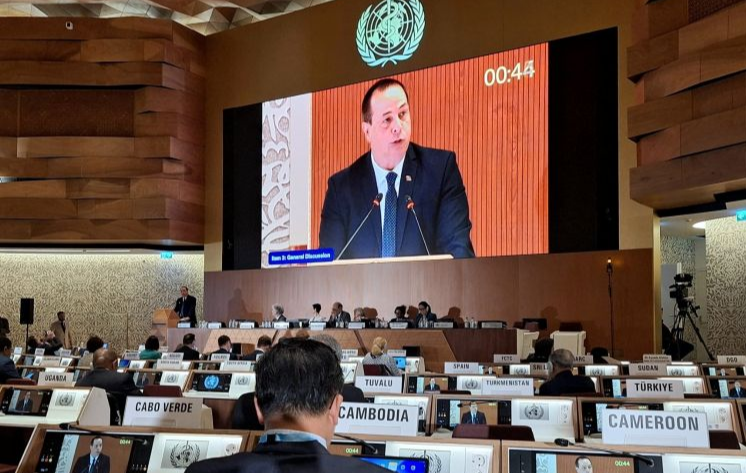
Photos: @japortalmiranda
By: Nuria Barbosa León
Cuba's commitment to international cooperation, the sovereignty of nations, and a strong, inclusive, and representative WHO marked Minister of Public Health Dr. José Ángel Portal Miranda's speech at the 78th World Health Assembly, which took place from May 19 to 27.
On his X profile, the Cuban minister stated, "A better world is possible if we all work to build it."
In his messages on the same social network, Portal Miranda highlighted that the forum has discussed crucial topics such as Sustainable financing for the World Health Organization, Universal healthcare coverage, and Global response to future crises in the sector.
Similarly, the Cuban delegation supported the agreement on pandemic prevention, response, and recovery, which had been analyzed, discussed, and negotiated for three years. The agreement is considered an instrument for better international coordination in various areas and aims to strengthen global health architecture for pandemic prevention, preparedness, and response.
The Pan American Health Organization (PAHO) announced on its website that the agreement was adopted with 124 votes in favor, zero objections, and 11 abstentions. The agreement was proposed in response to the devastating effects of the pandemic, motivated by the goal of ensuring the world is better prepared and responds more equitably to future outbreaks.
The signed document includes launching a process to draft and negotiate an Access to Pathogens and Benefit-Sharing (APBS) system through an Intergovernmental Working Group, which will then be evaluated at next year's World Health Assembly.
It is also the second international legal agreement negotiated under Article 19 of the WHO Constitution, after the WHO Framework Convention on Tobacco Control, adopted in 2003 and entered into force in 2005.
Dr. José Ángel Portal Miranda described the agreement as an important step toward strengthening collective action, emphasizing that its successful implementation requires greater international cooperation.
"Diseases do not recognize borders, ideologies, or levels of development. Therefore, uniting efforts to combat them is not just an option—it is an urgent necessity," Portal Miranda stated before the Assembly plenary.
He also emphasized that developing countries need sufficient and sustainable resources, which they cannot secure alone, making contributions from developed nations crucial to achieving the agreement’s objectives.
Reaffirming Cuba’s willingness to share its experiences and innovations for global health, the Minister of the Greater Antilles concluded by stating:
"It is our duty to ensure that the benefits of this agreement reach everyone. Today, more than ever, the world needs unity, solidarity, and shared responsibility. Cuba is and will always be in favor of life."
Meanwhile, on X, he announced that, as part of the activities in Geneva, Cuba organized a side event on Tuesday, May 20, addressing the importance of South-South Cooperation in facing current global health challenges.
He also noted that Cuba was elected on Monday as a member of the General Committee of the World Health Assembly, which convenes this year under the theme "A World United for Health."
As part of his agenda in Geneva, he met with representatives of solidarity groups supporting Cuba, thanking them for their support of the country, especially its National Health System, according to his X posts.

